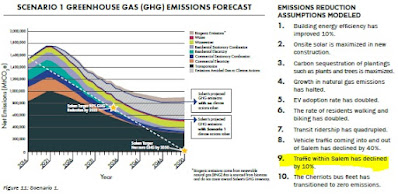The Policy Committee for our local Metropolitan Planning Organization meets on Tuesday the 24th, and in the minutes to last month's meeting are finally some details on the plan for Cordon Road. The Cordon Road website is not being updated, and the draft plan not yet published for public comment. It's a little weird.
Here's a map keyed to minutes from the last meeting. (The map here is a composite from materials published separately.)
 |
| South of Silverton Road widened |
South of Silverton Road the study recommends full widening to four lanes.
 |
| A "hybrid" design is preferred |
The recommendation for widening to four travel lanes just utterly ignores our need to reduce driving traffic in Salem.
 |
| First level Climate Goals: A 10% reduction |
That the study was going to ignore climate was strongly implied from the start:
- "Cordon-Kuebler Corridor Study Already Hinders Climate Goals" (2022)
- "Our CAP calls for Supporting Alternative No. 3 in Cordon-Kuebler Corridor Study" (2022)
They also sprinkle in several roundabouts.
 |
| Multiple roundabouts recommended |
If the plan is ever published for the public, whether in draft form with what now looks clearly like an insincere and fake public comment process, or is just simply published in final as a done deal, there will likely be more to say.
But it is just so disappointing to see the utter disconnect between our Climate Action Plan, larger climate goals, and travel forecasting and planning, which continue to call for more, more, MOAR driving.
As a footnote, they talk about closing driveways, noting that each driveway increases crash risk by 4%. But they also note that every 10 driveways reduces travel speeds by 2.5 mph.
 |
| Turning conflicts vs. speed reductions |
Closing driveways is often framed up as a move for improved safety, but the elimination of turning conflicts also induces higher travel speed.
Maybe at 55mph a change in a few mph is not very meaningful. And probably the net safety improvement from eliminating turning conflicts surpasses the smaller safety improvement from marginally slower speeds.
But on urban collector streets and arterials, in the zone between 30 mph and 40mph, a reduction of a few mph might be very helpful. This is a safety trade-off that may be insufficiently analyzed. For the moment it's something to register and file away, perhaps to revisit another time.
Again, McGilchrist was last month, not this month.
 |
| That's it?! Seems dismally low. |
On the agenda for this month, Cherriots has a presentation on the Commuter Options Plan. One slide in it has information on the just-concluded statewide Get There Challenge. Just over 1,000 participants for a statewide encouragement contest? That's really feeble, isn't it? Something's not working right. It would be interesting to see participation from the Salem area broken out, but that just might be much worse.
The bland carrots by themselves aren't working, sticks are necessary, and as long we we keep planning for road widening and induced demand, no amount of encouragement programming is going to make a dent.
- From August, "Transportation Options Group and Bike Rental System with more Ambition at Cherriots"
- And on the ineffectiveness of encouragement programming, "Break the Annual Cycles of Bike Month," "On the Decline of Cycling and a Grant for Salem Bike Vision," and "The Limits of Bike Culture and Encouragement Programming."
Also on the agenda also is formal approval of the TIP amendment to shuffle funds to the McGilchrist project. The memo describes it:
The city of Salem is requesting $3 million in SKATS federal funds to reduce local overmatch by $3 million. The city intends to use overmatch savings for other work on the McGilchrist corridor.
 |
| Sidewalk and crosswalks will probably be slighted |
At the moment there are still "unprogrammed funds remaining" for other projects, but allocating $3 million to an intersection "to increase traffic flow" is another instance of our planning running counter to our climate needs, and it will likely delay or otherwise hinder projects for sidewalks and crosswalks, which may request additional funds also or be delayed to free up funds for widening projects. Oversized projects have cascading effects.
At the end of the meeting packet are a couple brief notes of interest. There's an update on the Safety Action Plan group:
Steering Committee met July 13th –Working on Goals; in October, Technical Committee gave feedback on consultant memo of safety case studies (by safety emphasis areas) and possible solutions.The lack of public information, agendas, minutes, and other materials for the committee is disappointing.
The MPO also hired the part-time Safe Routes assistant.
The Policy Committee meets at noon on Tuesday the 24th. The meeting information with links to the agenda and packet is here.


No comments:
Post a Comment